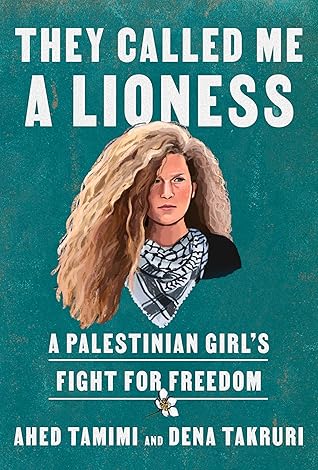More on this book
Community
Kindle Notes & Highlights
by
Ahed Tamimi
Read between
December 2 - December 4, 2023
For a second, I ask myself how I ended up here. How did it come to this? But I know better than to agonize over this question. This moment was inevitable, something I expected my whole life. Getting arrested by the Israeli army was always a matter of when, not if.
There’s even a color-coded identification system to help facilitate this apartheid. We’re forced to carry green identification cards at all times, which dictate the limited possibilities of our lives. The white license plates that Israel assigns to our cars stipulate which roads we’re allowed to drive on. The smoothly paved bypass roads—built exclusively for settlers, of course—are off-limits to us. Only Israeli cars with yellow license plates can drive on those.
I understood the asymmetry of it all; despite the fact that our flags, chants, and stones were no match for their rubber-coated steel bullets, tear gas, and sound grenades, the Israeli forces had no moral qualms about unleashing brute violence upon us.
Through them, I learned that our problem was not with the Jewish people but, rather, with Zionism. It’s not a religious problem, but a political one.
Even more infuriating is knowing that practically any Jewish person in the world can immigrate to Israel and get citizenship, even if they had never previously stepped foot in the country. And that so many tourists from around the world can easily see more of your country than you’ll ever be able to, despite the fact that you’re indigenous to it.
There, in Akka’s Old City, I felt transported to the past, but also to an alternative present, a realm of what was and what could have been had Israel not conquered our land and exiled us from it. I also caught a glimpse of a possible future when we could return to this land. I felt a sense of nostalgia, loss, and hope all at once.
But the answer is that our parents had no choice. Or, to be more accurate, the Israeli military robbed all of us, young and old, of a choice. At a very young age, most of us learned the hard way that we weren’t any safer inside our homes than we were out on the marches.
No seven-year-old should ever feel she has to shoulder the burden of documenting the human rights abuses taking place in her own backyard.
They also taught us that while it’s important to resist, we must never hate, because hatred will eat us up from inside.
I changed my lifelong dream of becoming a professional soccer player to becoming a lawyer, so I could fight for the justice we were so regularly being denied.
They also began deploying snipers, who fired live .22-caliber ammunition at protesters, aiming for their legs. We all knew they were aiming for a particular nerve in the lower leg that can leave a victim paralyzed. This wasn’t just happening in Nabi Saleh, but across other cities in Palestine, too.
In this way, the soldiers could ensure that their young victims would never be able to walk again, let alone throw stones in protest. The tactic was barbaric and cruel.
While I believe that it’s the right of all colonized, occupied, and oppressed people to stand up to their oppressors, I’ve always been convinced that staying alive and conveying our message through unarmed resistance is more powerful and strategic than our dying. I can’t serve the Palestinian cause if I’m dead.
But in my mind, I thought, Beach? What beach? Doesn’t he know that we can see the Mediterranean Sea from the highest hill in my village, but can only dream of going? Has he forgotten that, like other Palestinians in the West Bank, we’re banned from visiting thanks to his country’s laws?
Israel’s civil courts deny bail to Israeli children in only 18 percent of cases. But in cases involving Palestinian children, the military courts deny bail 70 percent of the time.
Israel’s response to these demonstrations was deadly. Each week, Israeli snipers opened fire on the protesters, ultimately killing hundreds and wounding thousands over the course of the year-long protests.
Women make up half our society, and they raise the whole of it.
Thirty-two U.S. states have passed anti-boycott laws—this in a country that claims to uphold free speech.
On one of the last days of Ramadan, Israeli police stormed the Al-Aqsa Mosque compound and attacked worshippers, firing tear gas and stun grenades at them, even as they prayed inside the mosque, our most venerated holy site. I couldn’t believe the scenes I saw unfolding on the news.
Nothing built on injustice and might lasts forever. Eventually, the oppressed find a way to liberate themselves.


